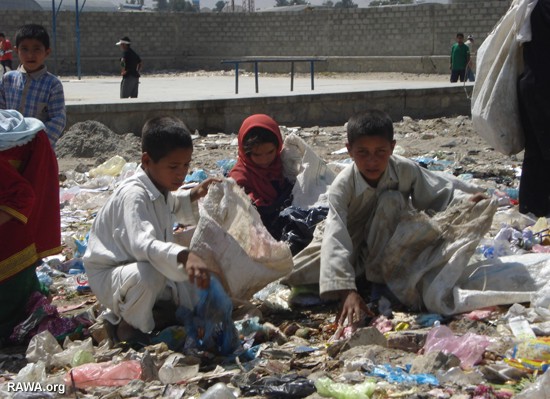KABUL — Shamsuddin, his wife and their three children sit cross-legged on the floor around the cloth that Afghans traditionally eat off and use bread to pick from a single dish of cooked wax beans and onion.

Up to 18 million people in Afghanistan live on less than US$2 a day and are considered food-insecure, FAO says
With a sliced cucumber for salad, this lunch cost nearly a full days' earnings, says the weary-looking man who makes about 100 afghani (two dollars) a day delivering vegetables in a wheelbarrow.
"For our next meal, I have no money. What can I do but to sleep hungry?" asks the swarthy 38-year-old, who has lived in a tent in a refugee camp on the outskirts of Kabul since returning from Pakistan five years ago.
Shamsuddin, who goes by one name, is among millions struggling to survive in war-ravaged Afghanistan, one of the world's poorest countries where unemployment is 40 percent and half the population is under the poverty line.
It is the poorest who are worst hurt by a global rise food prices which have nearly doubled in three years, according to the World Bank.
Inflation in Afghanistan reached 22 percent in February, including 30 percent for food. It was about five percent in February 2007.
Shamsuddin says that six months ago his family's simple lunch would have cost half today's prices. "Everything is expensive -- vegetables, cooking oil, bread," he says.
The price of wheat, which makes the flat naan bread that is part of every Afghan meal, has risen 50-100 percent in recent months depending on the area of the country, the World Food Programme says.
"For millions of Afghans, the poorer segments of society who spend up to 70 percent of their meagre income on food, these food price rises put the basic necessities simply out of their reach," WFP Asia director Anthony Banbury said last week.
Fatema, who lives with her five children in the same refugee camp, says her family often has to go hungry.
"The prices have gone up and we can't always afford our three meals a day," she says. The family moved into the camp six months ago when a flood washed away their village in northern Badakhshan province.
Wealthier households have also had to make cutbacks.
"We used to eat fruit every day; now we can afford it only twice or three times a week," says Mohammad Akram, who earns between 500 and 800 dollars a month selling mobile phones. He has also halved the family clothing budget.
Mohammad Khalid, who works two jobs for about 200 dollars a month, says he has had to change the family staple to rice, rather than bread.
"I couldn't afford flour, so I had to switch to rice," he says, explaining that a 50-kilogrammes (110 pounds) sack of low-grade rice feeds his family for a month whereas the same amount of flour would last 15 days and is only a few dollars cheaper.
Afghanistan's own drought-plagued agriculture sector -- neglected in an internationally aided development drive in place since the extremist Taliban regime was removed in 2001 -- is unable to meet the country's wheat needs.
Even in a good year, the nation's cereal deficit can be more than 500,000 tonnes, according to the WFP. In 2006, drought took this to 1.2 million tonnes.
Ahmad Shafaee, an official in the ministry of agriculture, says low snowfalls and rains were likely to see a 30-percent drop in domestic grain production this year from last.
Neighbouring Pakistan is Afghanistan's main source of food but it banned commercial exports of wheat flour to this country in January.
WFP, which has said the ban means it cannot get the food it needs for Afghanistan where it will support six million people this year, is in talks with Islamabad about "humanitarian exemptions," Banbury said during a recent trip here.
The Afghan government has meanwhile set aside 50 million dollars to buy wheat with Commerce Minister Mohammad Amin Farhang travelling to Kazakhstan this week to finalise a deal, said ministry spokesman Jawad Omar.
The food would be distributed at subsidised cost to civil servants and the poor, he said.
A humanitarian tragedy can be avoided, Banbury said, but "we all need to do our part.
"It will not be easy, it will cost money and it will take a lot of work," he said.



